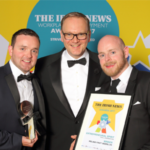What do you need to know before you walk away from the 9-to-5 to start your own business? We asked two entrepreneurs who did precisely that.
2017 was a record year for the number of new businesses registered in Ireland. Tools like Kickstarter, Shopify, and WordPress mean it’s never been easier or less expensive to start a new company.
But is it really as simple as it sounds? Unfortunately, while 61 new businesses were formed in Ireland on average every day last year, three existing enterprises became insolvent. The failure rate of startups around the world is generally held to be at about 90%.
“Most people take the easy option and make excuses”

Don’t quit the day job
As tempting as it might be, handing in your notice and starting your vegan smoothie brand overnight is probably the wrong move. In fact, many entrepreneurs will tell you that holding onto a steady income in the early stages of business makes it more likely that you will succeed.
Shane McCarthy studied finance at Queens University before embarking on a career as a trader that took him everywhere from Sydney, to New York and London. Today he is the founder and CEO of Ireland Craft Beers – an award-winning logistics and sales platform for Irish micro-breweries, cideries and distilleries.
Shane started the company as a side hustle while still working as a trader in London. “Even if you are working at an intense city job requiring ten hours sacrifice a day, you sleep for about seven hours, which gives you six hours to work and grind on something that you are truly passionate about,” he says. “Most people take the easy option and make excuses, though those who want it badly enough will put the time in.”
“When I first quit it was not to start a business”

Build slowly
Similarly, Lorenzo Newman studied at Trinity and then the London School of Economics before starting a career with a big four accountancy firm. Today he is a published author and managing director of Learn More – a boutique education consultancy and innovation shop.
Lorenzo’s passion for education slowly pulled him away from the corporate world, gradually building up the expertise to make his business a reality. “When I first quit it was not to start a business but to become a teacher. I wasn’t drawn to the idea of starting my own business so much as to the idea of leaving my job,” he explains. “After teaching, I worked as a freelance consultant for a year. It was only when the freelancing work grew, and I found myself sub-contracting work to other freelancers that I realised that it just made more sense to start a small company.”
“People often romanticise the idea of starting a business.”
Why are you doing this?
If your sole motivation for starting a business is to escape your current job, then it might not be the shrewdest course of action. For Lorenzo, his company grew out of work he was already engaged in and passionate about. “I think that because of all the hype around startups, people often romanticise the idea of starting a business. For many entrepreneurs though, I think it is just a sensible way of growing the same work they would be doing anyway, either as a freelancer or for a company.”
For Shane meanwhile, starting Ireland Craft Beers was about taking the understanding of money-making he acquired as a trader and applying it to something he truly loved. “The end goal was to do something I was passionate about, with friends, in an industry that would challenge me but also create a fun factor.”
“It’s critical to leave your old job on good terms.”
Leverage your network
Any new business is likely to have limited resources at its disposal. So before you quit your job, consider how you can cultivate your personal and professional networks to help your business succeed.
Your network may even provide the business partners you need to get the idea off the ground. “Leveraging personal and professional networks were certainly a massive factor towards Ireland Crafts Beers acceleration in business,” says Shane. “Our business became a team effort once a like-minded friend decided to leave accountancy and jump on board.”
Your network could also be the source of work. So even if you fantasise about flipping your desk and running into the sunset, it’s critical to leave your old job on good terms. “Most first-time entrepreneurs remain in the same sector, meaning the personal network you built in your previous job is a precious asset,” says Lorenzo. “In Learn More’s case, my team and I have collaborated with our former employers on various projects. When we pursue something on our own with a mutual client, we always reach out to make sure we’re not stepping on any toes.”
“Failure is a great learning curve, and going out and giving it a go takes a lot of courage”
Go for it
As important as the planning is, sooner or later you’re going to have to just go ahead and make your idea a reality. Many potential entrepreneurs hesitate on pulling the trigger because they feel like they’re not ready, but the truth is that most new business people just have to learn as they go. Lorenzo learned that if you are honest with yourself and your clients about what you can or can’t do in the beginning, you give the company a chance to grow as you do.
“Learn More is still a young consultancy, which means we need to take extra care to demonstrate to clients that we won’t take shortcuts or take on work we can’t complete to a high standard. Sometimes this means admitting to shortcomings or turning down work. But in a sector built on relationships, building trust through transparency is everything.” Experience is valuable, but it isn’t everything – in the early days what is most important is your drive and willingness to learn.
“Staying hungry, continuing to learn, wanting to problem-solve and removing fear from our mindset in unknown scenarios has worked very well for us,” says Shane. “If anything, failure is a great learning curve, and going out and giving it a go takes a lot of courage. Many also don’t realise that the corporate door will more than likely still be open if everything doesn’t go as planned.”
About
Shane McCarthy is CEO of Ireland Craft Beers – for more info click here.
Lorenzo Newman is managing director of Learn More – for more info click here.
Witten by Peter Flanagan.





